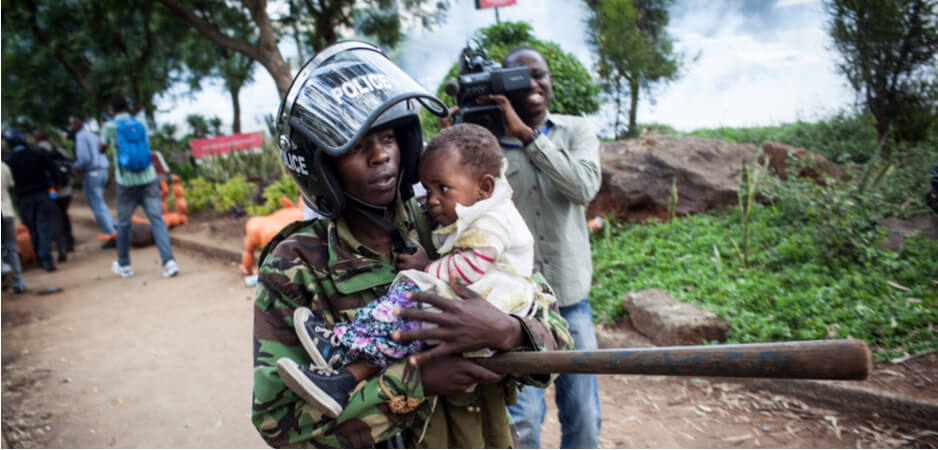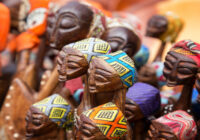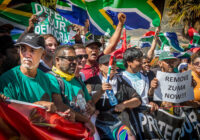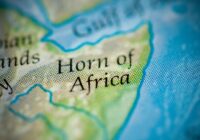The violation of human rights across the African continent began as a struggle for self-rule in the mid-20th century. Except for Liberia, which European countries assumed was an American colony, and Ethiopia, which was never colonized due to Haile Selassie’s resistance to Italian invasion, Africans waged bloody guerrilla warfare against the colonial powers scrambling to keep control.
Africans yearned for self-rule in order to be free to practice their local religions, take control of their land and live under their own leaders. By the end of the 20th century, all the countries that had been colonized had attained freedom and established republics across the continent. Africans were suddenly left in an experimental phase where they were left to administer for themselves.
Yet this brief moment of liberation and hope was quickly overshadowed by the emergence of Africa’s own colonizers — totalitarian leaders like Mobutu Sese Seko, living lives of opulence at the expense their citizens. Mobuto has been accused of massive plunder during his reign as the ruler of what was then Zaire, now the Democratic Republic of Congo. According to The New York Times, he is alleged to had embezzled up to $5 billion during his rule. Mobutu is said to have chattered private jets to go shopping in Paris, accompanied by his friends and family.
Mobutu, who seized power through a bloodless coup in 1960, was behind the execution of his predecessor, Patrice Lumumba, in 1961. According to Executed Today, in 1966 four members of his cabinet, including Prime Minister Evarisite Kimba, were executed before 100,000 people for plotting against the president.
The Ghosts Keep Coming Back
Another leader who rose to power at the early days of Africa’s transformation was Zimbabwe’s Robert Mugabe, a freedom fighter-turned-tyrant who introduced drastic land policies that saw white settlers lose their land to his cronies. Leaders of Zimbabwe’s ruling party, Zanu-PF, routinely raped female guerilla fighters during the Chimurenga Wars. Entire families and communities were also subjected to rape as punishment for disloyalty in the 1980s.
During Mugabe’s rule, which lasted nearly four decades, from 1980 to 2017, when he was ousted by the military in favor of his former aide, friend and vice president, Emmerson Mnangangwa. Zimbabwe’s agriculture-based economy never recovered after the shock of land reforms followed by isolation from the international community caused by Mugabe’s poor relations with most Western leaders. This led to economic sanctions being imposed on Zimbabwe in 2001 and 2002 by the European Union due to concerns over human rights violations, restrictions on the media and political violence.
At the same time, the United States sanctioned Zimbabwe for its involvement in the Congo conflict and violent land takeovers from the white settlers. The country’s currency became weak and almost useless due to poor economic policies, corruption and uncontrolled printing of money.
Inflation rates had risen from 17% in 1990, 48% in 1991 231,000,000% in 2008, meaning a banknote of 10,000,000 Zimbabwean dollars could buy no more than basic commodities like bread. The introduction of multiple denominations of the currency meant people had to carry bags of cash just to buy food.
In East Africa, Ugandans had to put up with a bellicose Idi Amin Dada Oumee, whose eight-year rule between 1971 and 1979 rivaled the colonial abuses. According to reports from numerous international human rights groups, by the time Idi Amin went into exile in Saudi Arabia in 1978, he had caused the death of close to 300,000 people Uganda. According to The New York Times, Amin used death squads and the military police force of about 18,000 men to murder shopkeepers, clerks, farmers and students who were either shot dead or forced to cudgel each other to death as police watched. These henchmen were mostly recruited from Idi Amin’s home region near the border with Sudan that is dominated by the Kakwas ethnic group.
The 1972 failed coup attempt by supporters of the first president of Uganda exiled in Tanzania, Milton Obote, was met with a retaliatory massacre. It later emerged that civilian lives had been lost, including many disappearances. Among those killed by Amin’s army included religious leaders, members of other ethnic groups, journalists, artists, bureaucrats, judges, students, lawyers, intellectuals, foreign nationals and petty criminals. When Amin died in July 2003 in Saudi Arabia, where he had been exiled since being deposited in January 1979, no charges had been brought against him.
Follow the Footsteps
Most African countries have since gotten rid of their founding fathers like Omar Bongo of Gabon, who led the country for four decades until 2009, when he died in office, and Blaise Compaoré of Burkina Faso, who was overthrown in 2015.
It is natural to expect Africa to have made strides and learned from these past political missteps, but that has not been the case. Most current African leaders have followed in the footsteps of leaders who came before them in suppressing the rights of their constituents in line with the famous phrase in East Africa, “fwata nyayo” — follow the footsteps — coined by Kenya’s second president, Daniel Arap Moi, who vowed to follow in the footsteps of founding president, Jomo Kenyatta.
According to Kenyan economist Martin Oduor’s biography of Moi, “Beyond The Shadows Of My Dream,” his presidency almost brought Kenyan economy to its knees, thanks to massive looting and corruption in his government and poor international relations. A “dream team” consisting of six professionals in the fields of economics, tourism and finance had to be formed with supervision of the World Bank in 1999 to repair Kenya’s damaged human rights image and the economy. Unfortunately, the team never achieved its goals due to sabotage from President Moi’s inner circle whose interests were threatened by its activity.
As most of the African countries are marking half a century since attaining self-rule, political opponents continue to die or disappear. Across Africa, a rise to power has been turned into a do-or-die trial, accomplished in a vacuum of democracy amidst rampant human rights violations. According to the Economist Intelligence Unit’s 2017 Democracy Index, Mauritius is the only country in Africa with a full democracy. The country has managed to put up strong democratic structural governance through observation of a parliamentary democracy.
However, just Cape Verde, Botswana, South Africa, Senegal and Ghana are considered to have a flawed democracy, while the rest of the countries are split between so-called “hybrid regimes,” like Mali and Kenya, or outright authoritarian rule, like the DRC and the Central African Republic.
These democratic flaws are manifest across the continent, often in violent ways. Just weeks before the 2017 general election in Kenya, the director of the Independent Electoral and Boundaries Commission’s (IEBC), Christopher Chege Msando, went missing. Msando, who was mandated with overseeing the electronic transmission of the polls, was later found dead, his body dumped in a thicket in Kikuyu, 22 kilometers outside the capital Nairobi. According to Kenya’s chief government pathologist, Johassen Oduor, Msando died from strangulation.
The country had resorted to electronic voting process following disputes in previous polls following widespread voter fraud, denying citizens their democratic right to free and fair elections. Msando’s murder added tension to an already highly contested election. Speaking on national television hours before his disappearance, Msando had assured the country that the system was a 100% temper-proof. At his funeral, former Kenyan Prime Minister Raila Odinga alleged that Msando was killed because he refused to surrender the password that was used to rig the elections.
Kenya has had a high record of disappearances and murder dating back to the earlier days of self-rule following independence from Britain in 1963.
Unfortunately, he was not the last to die during this election period. Many lives were lost following the announcement of the results by the IEBC chairman, Wafula Chebukati, on August 10. According to the Kenya National Commission on Human Rights, 37 were killed due to excessive use of force by police during the quelling of protests against Uhuru Kenyatta’s reelection.
Among those killed were two children. Six-months-old baby Pendo was beaten on the head with a baton when the police raided a house in the opposition stronghold city of Kisumu, few hours after the announcement of the election results. In Nairobi’s Mathare slum, 9-year-old Stephanie Moraa was killed while playing on the balcony of her parent’s apartment. Moraa was killed by a stray bullet fired by anti-riot police following run-ins between the police and opposition party supporters.
This was not the first time Kenya was experiencing election violence. According to Human Rights Watch, over 1,000 people died and 500,000 were displaced following a two months-long political crisis during the 2007-08 election.
Kenya has had a high record of disappearances and murder dating back to the earlier days of self-rule following independence from Britain in 1963. The most notable was the murder of Kenyan Tom Mboya — trade unionist, educator, pan-Africanist, author and independence activist — who was murdered on July 5, 1969, in broad daylight in Nairobi’s business district.
Confusion and Uncertainty
On February 15, when Nigeria’s Independent National Electoral Commission (INEC) pushed forward the general elections citing logistical difficulties, a large part of the electorate was affectively denied its constitutional right to vote. People had to reschedule their travel plans as one is only eligible to vote at the polling station within his/her registration location. Owing to the high level of poverty in Africa’s largest democracy, most couldn’t afford to either stay the week or return a week later.
When the elections finally came, they turned bloody. According to civil society organizations, at least 35 Nigerians were killed in the violence that was inflamed by politicians and their aides inciting supporters. The elections, which were won by the incumbent president, Muhammad Buhari, left citizens divided along regional, ethnic and religious lines.
Suspicions have also circulated that attacks by the armed group Boko Haram could be politically motivated due to their alignment to some politicians and political parties who have funded the Islamist militia’s activities. Speaking during a press conference on January 6, Alhaji Mohammed Imam, who lost in the February polls after running for the Borno state governorship, said that there was an urgent need to set up an inquiry into the attacks. Following President Buhari’s inauguration on May 29, the government is yet to follow up on claims of Boko Haram’s interference in the February elections.
Boko Haram is not the only militia on the continent with political connections. In April 2015, the Somali terrorist group al-Shabaab carried out its attack on the Garissa University in northeastern Kenya that killed 148 and left at least 70 students injured. Aden Duale, National Assembly majority leader, warned that he was going to reveal the names of politicians and powerful people in Kenya who fund or sympathize with the group — a promise which four years down the line Kenyans are still waiting for. The al-Qaeda-affiliated group has been terrorizing Kenya since its forces deployed as part of the African Union Mission to Somalia in a bid to flash out al-Shabaab.
From Bad to Worse
Since the government of president Abdel Fattah el-Sisi took power in Egypt after overthrowing the democratically-elected President Mohamed Morsi in 2013 after just two years in office, the North African country has been hostile to press freedom and put in place strict internet censorship rules. Morsi died in court on June 17, provoking an outcry against his alleged mistreatment in prison and denial of medical care.
On December 20, 2016, an Egyptian national and journalist for the Qatari network Al Jazeera, Mohammed Hussein, was arrested when he returned to Egypt for his annual leave. Hussein, who remains detained to this day without trial, was accused by Egypt’s interior ministry of “disseminating false news and receiving monetary funds from foreign authorities in order to defame the state’s reputation.” Despite a court order for his release being upheld in May, Egyptian authorities have opened a new investigation against him.
On February 18, an American journalist, David Kirkpatrick, was held for seven hours without food or water before being sent back on a flight to London. According to Al Jazeera, Kirkpatrick, the former New York Times Cairo bureau chief, was held at the airport where his mobile phone was confiscated. The government is yet to offer any explanation on the grounds of his blocked entry.
Since coming to power, Sisi instituted a regime with an even more appalling human rights record than that of Morsi’s predecessor, Hosni Mubarak, who ruled Egypt from 1981 to 2011, before becoming one of the most prominent leaders to fall in the Arab Spring.
Sisi’s government has been accused of detaining at least 60,000 political prisoners either without a fair trial or no trial at all. According to Human Rights Watch, the president has used counterterrorism laws to prosecute peaceful dissidents, while the police and the national security agency have systematically used torture and enforced disappearances.
On April 20, Egyptians voted in a referendum to amend the country’s constitution that will allow Sisi to stay in power until 2030 if he wins the next elections in 2024. The amendments, approved by the electoral body on April 23, also give the military vast powers to intervene in the political process without being accused of overstepping its role, as well as giving the president powers over judicial appointments.
In a country with extensive censorship restrictions on social media and independent news sites being shut down for criticizing the government, many see these amendments as paving the way for outright dictatorship.
Crop of New Visionaries
Young Africans who have yearned for change or showed signs of rebellion have been met with a robust response. In 2017, when 37-year-old Rwandan businesswoman and women’s rights activist Diane Shima Rwagara announced that she would be running for office against veteran politician and current president, Paul Kagame, she was arrested alongside her mother and sister. Rwagara and her mother were charged with forgery and tax evasion.
Rwagara, a fierce critic of Kagame, was earlier barred by the Rwandan electoral authorities citing her use of names of deceased people on her list of signatures as well as the names of others who belong to a rival political party. She was unlawfully detained along with her mother for over a year and charged with treason, facing 20 years in prison had the court found her guilty.
Her story could well be related to that of Ugandan pop star-turned-politician Robert Kyagulanyi Ssentamu, better known as Bobi Wine. The ardent critic of long-serving President Yowere Museveni, who has been in power since 1986, was detained following a political campaign in the northwestern town of Arua last August. Ugandan authorities said Wine was among the group who threw stones at the president’s convoy, charging him with treason. Upon his release, Wine, who visibly struggled to walk during his court hearing and alleged he was tortured in detention, had to seek medical treatment in the United States.
Wine was again arrested on April 29 and held for three days in a maximum-security prison. He was charged with incitement and leading anti-government protests, which the court said he committed in July 2018. But Wine is popular among the youth and has just announced he will be running for president in the elections due in 2021.
Uganda is one of many African countries where demonstrations are often met with the use of teargas, water cannon, rubber bullets and, in some cases, live bullets to disperse crowds despite most of the countries’ constitutions allowing for peaceful protest. The Ugandan government has also gone as far as tracking down social media activists who use the internet to advocate for change. Despite continued public outcry and pressure from the international community, there are no signs political detentions across Africa will be stopping any time soon.
Not Enough
In March this year, Congo’s newly elected president, Felix Tshisekedi, freed 700 political prisoners who were detained by his predecessor, Joseph Kabila. In Sudan, former President Omar al-Bashir ordered, on International Women’s Day, the release of women political prisoners detained during protests that have rocked Sudan since December 2018.
That was not enough to quell public unrest as protest continued. Giving into pressure, the military suspended the constitution and arrested al- Bashir on April 11. But talks between the opposition and the military stalled after the two parties failed to reach an agreement on the transition to civilian rule. The opposition has accused Egypt, United Arabs Emirates and Saudi Arabia of interfering.
On May 13, Sudan’s prosecutor announced that Omar al-Bashir had been charged with the killing of protestors. This came few weeks after the prosecutor had ordered al-Bashir to be interrogated for money laundering and financing terrorism. Al-Bashir is also wanted by the International Criminal Court for genocide and war crimes and genocide in Darfur, where some 300,000 were killed.
June 3 marked the worst violence in the crisis as the country’s infamous Rapid Support Forces — formerly the Janjaweed militia that brutalized Darfur — attacked and burned down the protesters’ camp, killing at least 30. As a result, the African Union suspended Sudan’s membership, but condemnations of violence by the United Nations, Britain, Norway and the US seem to have fallen on deaf ears in Khartoum. While the ruling military council and the opposition did sign a deal on July 17 agreeing on a transitional period to full civilian rule, whether the army will relinquish its three-decade hold on power is still under question.
This all makes for a grim picture of human rights and African democracy. But people are becoming more empowered and positively aggressive, getting their voices back and ready to risk it all to keep the leaders in check. Across the continent, Africans — especially the younger generation — have united thanks to the use of internet and cross-border university enrollment, finding that they may be fighting the same cause.
With a youth population of 226 million, Africa seems to be headed in the right direction when it comes to political reform. The long wait for democracy could be nearing its goal in the next decades after almost a century of dangerous, hard work and resistance by previous generations.
Africa’s young people can see that the old guard failed to make any meaningful changes to benefit the continent. Recently, youths in Algeria and France played a major role in ousting President Abdelaziz Bouteflika, who had ruled for two decades and was planning to run for the presidency in the April elections before giving in to protests. It is now only a matter of time. In the next two decades, most of the long-serving “African presidents for life” will not be in power, driven out not by age but by demands for change and a brighter future by the youth. As witnessed in Uganda, Algeria and Sudan, among others, the continent is suddenly very alert.
For the first time in history, an African president, South Africa’s Jacob Zuma, was forced to resign and is currently under official inquiry for corruption. Although there is still work to be done for democracy across the continent, Africa is on its way.
The views expressed in this article are the author’s own and do not necessarily reflect Fair Observer’s editorial policy.
Support Fair Observer
We rely on your support for our independence, diversity and quality.
For more than 10 years, Fair Observer has been free, fair and independent. No billionaire owns us, no advertisers control us. We are a reader-supported nonprofit. Unlike many other publications, we keep our content free for readers regardless of where they live or whether they can afford to pay. We have no paywalls and no ads.
In the post-truth era of fake news, echo chambers and filter bubbles, we publish a plurality of perspectives from around the world. Anyone can publish with us, but everyone goes through a rigorous editorial process. So, you get fact-checked, well-reasoned content instead of noise.
We publish 2,500+ voices from 90+ countries. We also conduct education and training programs
on subjects ranging from digital media and journalism to writing and critical thinking. This
doesn’t come cheap. Servers, editors, trainers and web developers cost
money.
Please consider supporting us on a regular basis as a recurring donor or a
sustaining member.
Will you support FO’s journalism?
We rely on your support for our independence, diversity and quality.






